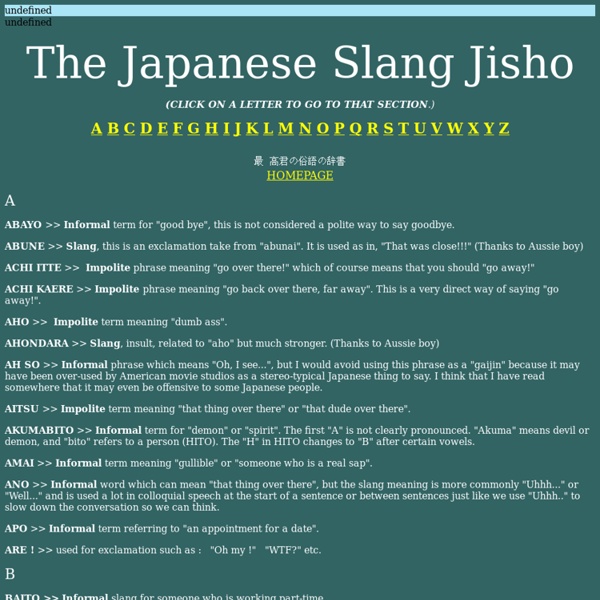The Japanese Slang Jiko

Coolest Traveling » The Best Japanese Slang Dictionary Online
elcome to the premier dictionary of Japanese slang and colloquialism! Below you will find an update-to-date collection of colloquial expression, dialects, borrowed phrases, and pure, modern slang. Enjoy! P.S. Errors including typos and definitions are also welcome! Japanese Slang Dictionary Updates: -8/6/08: Added Japanese Characters and useful links.-11/18/08: Added a few more words and cleaned up some as well. Aho(u)-(あほ)-An insult along the lines of “stupid” or “idiot”. Aitsu-(あいつ)-A very impolite way to say “that person” or “that guy over there”. Ano.. Are-(あれ)-Literally means “that” (and implies mutual understanding and knowledge) but depending on the context can refer to sexual activities or parts. Are?! Asoko-(あそこ)-Literally meaning “there” (and implies mutual understanding and knowledge) but depending on the context can refer to the sexual organs. Atashi-(あたし)-A contracted form of “Watashi” that is commonly used by girls to say “I” Baba-(ばば)-An insulting way to say old lady. Eeee….
Japanese dictionary
<div class="alertmsg"> ご利用のブラウザは JavaScript が無効に設定されています。<br />お手数ですが、ブラウザの JavaScript を有効にして再度アクセスしてください。 </div> * データの転載は禁じられています。 スポンサーサイト検索
AJATT: All Japanese All The Time
日本文化いろは事典 | 胸はって、ニッポン人!
CAUSATIVE AND PASSIVE
Posted by Tae Kim We will now learn the last two major types of verb conjugations: causative and passive forms. These two verb conjugations are traditionally covered together because of the notorious causative-passive combination. We will now go over what all these things are and how they are used. Causative Verbs Vocabulary Verbs conjugated into the causative form are used to indicate an action that someone makes happen. 全部食べさせた。 Causative Conjugation Rules Here are the conjugation rules for the causative form. Examples Here are some examples using the causative verb. 先生が学生に宿題をたくさんさせた。 When asking for permission to let someone do something, it is more common to use the 「~てもいい」 grammar. トイレに行かせてくれますか。 A Shorter Alternative There is a shorter version of the causative conjugation, which I will go over for completeness. The key difference in this version is that all verbs become an u-verbs with a 「す」 ending. 同じことを何回も言わすな! Passive Verbs Passive Conjugation Rules All passive verbs become ru-verbs.
Related:
Related:



